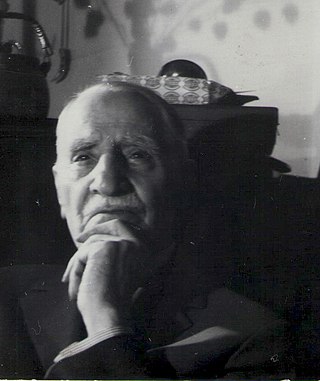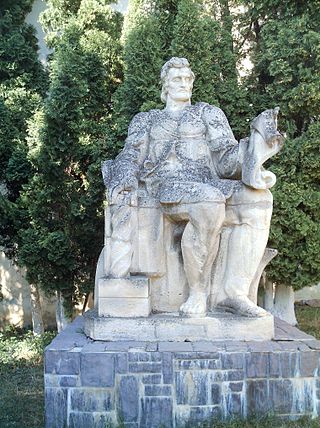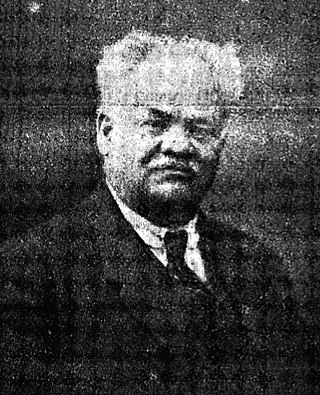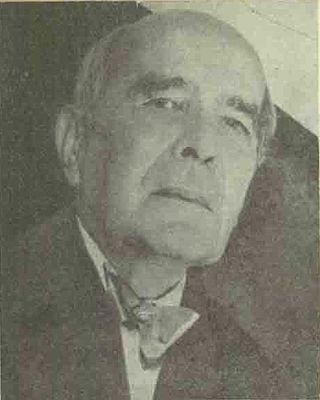| |||||
| Decades: | |||||
|---|---|---|---|---|---|
| See also: | |||||
Events from the year 1946 in Romania. The year started with the end of the royal strike and ended with the Romanian Communist Party win the first election following the introduction of women's suffrage.
| |||||
| Decades: | |||||
|---|---|---|---|---|---|
| See also: | |||||
Events from the year 1946 in Romania. The year started with the end of the royal strike and ended with the Romanian Communist Party win the first election following the introduction of women's suffrage.

Iorgu Iordan was a Romanian linguist, philologist, diplomat, journalist, and left-wing agrarian, later communist, politician. The author of works on a large variety of topics, most of them dealing with issues of the Romanian language and Romance languages in general, he was elected a full member of the Romanian Academy in 1945. He was head of its Institute of Linguistics between 1949 and his retirement in 1962.
Alexandru Zub is a Romanian historian, biographer, essayist, political activist and academic. A former professor at the University of Iași, noted for his contribution to the study of cultural history and Romanian history, he is currently head of the A.D. Xenopol Institute of History. He was elected a full member of the Romanian Academy in 2004 ; currently, he serves as head of the Academy's History Department.

Coresi d. 1583, Brașov was a Romanian printer of the sixteenth century. He was the editor of some of the earliest printed books in the Romanian language.
Camil Bujor Mureșanu was a Romanian historian, professor and author.

Nicolae Ionescu was a Romanian politician, jurist and publicist, brother of the agronomist Ion Ionescu de la Brad. He was leader of the Free and Independent Faction, serving several terms in Chamber and Senate, most often as a representative of Roman County, and was helped to establish several liberal coalitions in the 1860s and '70s. His career peaked just before the Romanian War of Independence, when he was Minister of Foreign Affairs in the cabinet of Ion Brătianu. Ionescu ended his career in politics with the National Liberal Party. A professor of world history and a rector of Iași University, he was also one of the founding members of the Romanian Academy.

Constantin A. Crețulescu or Kretzulescu was a Romanian academic, politician, and honorary member of the Romanian Academy from 1871. He served as Prime Minister of Romania and Minister of Justice from 1 March 1867 until 4 August 1867.

Ioan Constantin Filitti was a Romanian historian, diplomat and conservative theorist, best remembered for his contribution to social history, legal history, genealogy and heraldry. A member of the Conservative Party and an assistant of its senior leader Titu Maiorescu, he had aristocratic (boyar) origins and an elitist perspective. Among his diverse contributions, several focus on 19th-century modernization under the Regulamentul Organic regime, during which Romania was ruled upon by the Russian Empire. As a historian, Filitti is noted for his perfectionism, and for constantly revising his own works.

Gheorghe Bogdan-Duică was an Imperial Austrian-born Romanian literary critic. The son of a poor merchant family from Brașov, he attended several universities before launching a career as a critic, first in his native town and then in Czernowitz. Eventually settling in Bucharest, capital of the Romanian Old Kingdom, he managed to earn a university degree before teaching at a succession of high schools. Meanwhile, he continued publishing literary studies as well as intensifying an ardently nationalistic, Pan-Romanian activism. He urged the Romanian government to drop its neutrality policy and enter World War I; once this took place and his adopted home came under German occupation, he found himself arrested and deported to Bulgaria. After the war's conclusion and the union of Transylvania with Romania, he became a literature professor at the newly founded Cluj University. There, he served as rector in the late 1920s, but found himself increasingly out of touch with modern trends in literature.
Dumitru Caracostea was a Romanian folklorist, literary historian and critic.

Paul Bujor was a Romanian zoologist, physiologist and marine biologist, also noted as a socialist writer and politician. Hailing from rural Covurlui County, he studied biology in France and Switzerland, where he was attracted by left-wing ideas; his evolutionary biology, informed by the work of Carl Vogt, veered into Marxism and irreligion. Returning to the Kingdom of Romania, he was a junior member of the Romanian Social Democratic Workers' Party, active on its moderate wing. He earned the critics' attention in the 1890s as a short story writer with a socialist and pacifist message, but only returned to fiction writing briefly, in the 1930s. An award-winning ichthyologist, Bujor was hired by the University of Iași, where he taught for 41 years, and throughout the period worked on documenting the Black Sea fauna, and made discoveries concerning the environment of Techirghiol Lake. He inaugurated the Romanian study of animal morphology, while also contributing to histology, embryology, and parasitology, and gave popular lectures on evolution and physical culture.

Adrian Maniu was a Romanian poet, prose writer, playwright, essayist, and translator.

Alexandru Rosetti was a Romanian linguist, editor, and memoirist.

Victor Spinei is Emeritus Professor of history and archaeology at the Alexandru Ioan Cuza University, member and vice president of the Romanian Academy. He is a specialist on the history of Romania and the Romanian people in the Early and High Middle Ages, the history of migratory peoples in Eastern and Southeastern Europe during this period, and the production and circulation of cult objects in Eastern and Southeastern Europe during the Middle Ages.

Ioan Popovici was a Romanian general and commander of the Romanian 1st Army Corps from 1916 to 1918 during World War I.
The foreign policy of Romania in the years preceding the outbreak of World War I was characterized by the nation's need to contend with the rise and shifting rivalries of the Great Powers of the pre-war era. Its primary objectives were to maintain its territorial integrity and maintain friendly relations with neighboring nations. This culminated in Romania secretly joining the Triple Alliance in 1883. However, the nation would later reverse course, declaring neutrality for the first two years of the war before entering on the side of the Triple Entente in 1916.
Events from the year 1944 in Romania. The year was dominated by the Second World War. The year started with the Soviet Army assault on Romanian troops and the Battle of Romania. King Michael led a coup d'état during the year and Romania left the Axis powers and joined the Allies. The Romanian army subsequently won victories against German and Hungarian troops.
Events from the year 1954 in Romania. The year was marked by the 1954 Romanian blizzard.
Events from the year 1925 in Romania. The year saw Miron Cristea elected the first Patriarch of All Romania and ended with the start of the Romanian dynastic crisis.
Events from the year 1922 in Romania. The year saw the Dealul Spirii Trial and the crowning of King Ferdinand.